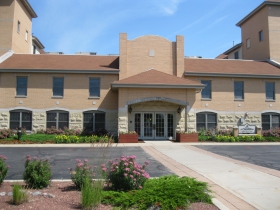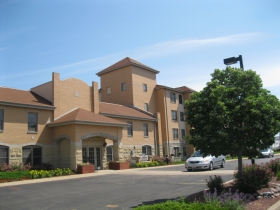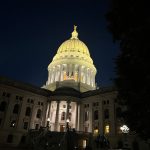Rembert Weakland’s Blandly Secular Apartment
Rejected in his attempts to live among fellow monks, Weakland resides anonymously in a south side seniors complex.
It has elements of a Medieval tale: an elderly monk makes a pilgrimage from abbey to abbey searching for a home where he can spend the rest of his life with his brothers. Time and again the abbey doors are bolted in his face. The wandering monk was once an archbishop and lived in an apartment at the great cathedral above the tombs of his predecessors. Now, he is resigned to his fate: he must spend his final days in the secular world, living not with fellow monks, but in an apartment at The Chopin, “The heart of the Wilson Commons Senior Living Campus,” a for-profit, non-denominational housing complex at 1400 W. Sonata Drive, near Wilson Park in southwest Milwaukee.
For this is the story of the outcast Rembert G. Weakland, the brainy ecclesiastic who became the 9th archbishop of the episcopal see of Milwaukee in 1977, serving until he retired in disgrace in 2002 after it was revealed he had spent over $400,000 of archdiocesan money to buy the silence of a former adult male love interest. Things got worse for his legacy when the extent of the pedophile priest scandal in Milwaukee — much of it under Weakland’s watch — was revealed. Today, the Archdiocese is in bankruptcy; Weakland’s name is not mentioned when prayers for clergy are made in church. He has disappeared from the diocesan website. Some demand his bronze image be removed from St. John’s Cathedral, which he redecorated in 2001.
Now 87, Weakland has been twice rebuffed in his attempts to spend his final days in a religious community.
He had hoped to move to St. Vincent Archabbey in Latrobe, Pennsylvania on September 1st. St. Vincent, founded in 1846, is the oldest and largest Benedictine Monastery in the United States. Weakland had entered the novitiate at St. Vincent in 1945, taught music at St. Vincent College there from 1957 to 1963, and became coadjutor archabbot, as well as chancellor and chairman of the board of St. Vincent College that year. In 1967, he began a ten year stint as the international leader of the order prior to assuming his Milwaukee seat, so the move would be much like coming home for the Pennsylvania native.
But a telephone conversation with the archabbot on June 27th forced him to cancel his plans, he told the Catholic Herald: “[Archabbot Daniel R. Nowicki] feels it’s not a good time for me to come so he wants me to postpone coming indefinitely – and I am 87 so it’s not indefinite – so I am going to stay on living here where I am, Milwaukee, and see how that goes.”
Back in 2009 Weakland had hoped to move to St. Mary’s Abbey in Morristown, N.J. At the same time his autobiography, “A Pilgrim in a Pilgrim’s Church: Memoirs of a Catholic Archbishop,” was published in which he discussed his homosexuality and the sex abuse crisis in the diocese he had once run. It included such remarkable revelations as Weakland’s contention that he had been unaware sex with a minor was a crime.
The publicity surrounding Weakland’s revelations brought concerns his presence might harm the abbey and the preparatory school it runs, so he withdrew his acceptance of the offer to live with the monks.
So, it’s back to the apartment at Wilson Commons, on the site of the former De Paul Rehabilitation Hospital, where Weakland has lived since 2006. His building, the Chopin, has 151 units, ranging from the 1,200 square foot 2-bedroom 2-bath Beethoven to the 630 square foot 1-bedroom 1-bath Crescendo. Other units in the musically themed development include the 17 unit Chopin Ranch and the 71 unit Polonaise. The Polonaise is valued at $6,425,000 and is taxed at $197,938.71. The Chopin Ranch is valued at $1,820,000 and the Chopin at $10,692,000, taxes $327,651. The development is all owned by the “Tarantino Family of Companies” under the Capri Communities umbrella. It is one of 12 complexes the firm owns and manages in southeast Wisconsin. Its 1113 units (as of 2013) ranked it 80th largest among such firms in the United States.
Weakland’s home was built in 2003, with $20 million of its $24 million funding coming from WHEDA.
Tarantino and Co. owned by James Tarantino, who began constructing senior living housing in 1985. He was a 1978 Brown Deer High School graduate and VISTA volunteer who later became involved with the former East Side Housing Action Coalition, or ESHAC, where he spearheaded the development of Hedwig House on N. Humboldt Ave. in Milwaukee and became the Community Block Fund Development administrator in Waukesha, where the firm is now based.
The “communities” built by Tarantino include various amenities like lounges, parlors, hair salons, and, in the case of the Chopin, the Harold A. Breier Dining Room (named after the former Milwaukee police chief) and a chapel where “Fr.” Weakland says mass daily (twice or three times on Saturday.)
Weakland also contributes to the community newsletter occasionally.
About Rembert Weakland
The Most Reverend Rembert George Weakland O.S.B., Emeritus Archbishop of Milwaukee, grew up in the tiny, coal-mining town of Patton, Pa., high in the Allegheny Mountains, during the Great Depression. Weakland’s father died when the young boy was just 6, and his mother was forced into public assistance. “I grew up with a distaste of powdered eggs and powdered milk,” Weakland told Bruce Murphy in a 1991 feature for Milwaukee Magazine, recalling the many meals his mother made using government surplus items. He felt singled out and embarrassed because of the government-issued clothing he had to wear.
Weakland sought to prove his worth with intellectual accomplishments, Murphy writes. His mother had an old upright piano and, beginning at age 7, he taught himself to play, devouring a graded series of lessons in a 10-volume music encyclopedia. He was the best student in his class and upon entering the Benedictine Monastery in Latrobe at age 13, he blossomed into a superstar, a concert-quality pianist who could play from memory for hours, and went on to study music at the Juilliard School and in Europe. He became fluent in Latin, Greek, German and French and needed special tutoring in classes such as Aramaic and Sanskrit. He would later add Italian, Spanish and Portuguese to his repertoire.
He rose to head of the music department , then to arch abbot and, in 1967, to abbot primate of the worldwide Benedictine Order at age 40, making him the first American and the youngest person ever to hold that position.
As abbot primate, he traveled the world visiting and working to modernize Benedictine monasteries. He had known Pope Paul VI since the pope was a cardinal, and the two would meet to discuss Benedictine affairs or for Weakland to report on the condition of the church in countries he visited. Given Weakland’s musical accomplishments, he was a natural choice to work on the Vatican II committee that created the new, English-language liturgy for the church.
Weakland was a Vatican insider who was mentioned as a possible candidate for pope after the death of his patron Pope Paul, but John Paul II soon rose to power and his conservative politics often left Weakland at odds with Vatican pronouncements. The New York Times dubbed Weakland “the nation’s most outspokenly liberal bishop.” He placed women in positions of authority, criticized militants in the anti-abortion movement and testified in favor of gay rights. He was a prolific writer, writing or co-writing more than a dozen books, and was tremendously influential.
But Weakland was also very protective of abusive priests during his entire time as Milwaukee archbishop and has provoked outspoken condemnations of him from victims of abuse, who have called for the archdiocese to remove the image of Weakland as a protector of children at the cathedral. His sorry record on the clergy abuse issue, along with his use of diocesan funds to pay off his adult male lover, continues to overshadow left once-lofty reputation as a international leader in church reforms.
The Rundown
- Location: City of Milwaukee
- Neighborhood: Wilson Park
- Subdivision: None
- Year Built: c. 2003
- Style: Modern Purpose-built senior living community
- Size: between 630 and 1250 square feeet
- Fireplaces: None in unit
- Air Conditioning: Central
- Rec Room: Parlors, alcoves, activity rooms and the Harold A. Brier Dining Room
- Assessment: Nearly $20 million for total development. Unit assessment cannot be determined.
- Walk Score: 29 out of 100. “Automobile Dependent”
- Transit Score: 41 out of 100. “Some Transit”
- Street Smart Walk Score: 14 out of 100. “Car Dependent”
How Milwaukee Is It? The residence is about 5 miles south of and a mile west of City Hall.
Photo Gallery
House Confidential Database
| Name | City | Assessment | Walk Score | Year |
|---|---|---|---|---|
| Name | City | Assessment | Walk Score | Year |























The “charges” of child pornography were not disputed, they simply were not made. Archabbot Nowicki asked for a police investigation of a computer in a common room work space on a college campus to be investigated because he had had it privately survailed and Contended that it had been used exclusively by Gruber, an outspoken conservative critic of his regime and the regime of Archbishop/Abbot Rembert Weakland, and that it contained illegal materials. Naturally the police investigated this allegation especially as Pennsylvania is a zero tolerance state. But the independent police investigation found no such illegal materials. A second initiative by Nowicki with the state police likewise produced no evidence of illegal activity. But it did show that there were simply multiple users of the computer in question. No charges were ever made. Gruber has no record or file with the state police or the County of Westmoreland. For your article to say that the charges were disputed leaves a mistaken impression perhaps. And in these days where figures are destroyed by innuendos and half true statements it is especially important to be very careful .
It is possibly misleading to say that there were “disputed charges” against Mark Gruber regarding the possession of computer derived child pornography. The word “charge ” in the context of criminal behavior would indicate to many readers that Gruber was arrested but that in his case the arrest was not prosecuted because it was… disputeable. The fact is that Gruber was never arrested and no charges were ever made; and of that there is no dispute.
Yes, Nowicki alleged criminal misuse of a computer, twice, and publicly promoted this idea. But PA is a zero tolerance state and after two FBI level investigations of the computer it was found that no criminal abuse occurred on it and that , contrary to Nowicki’s assertions , the computer was public use and college student accessed. Since Gruber, laicized or not , should enjoy the minimal journalistic respect of any citizen, the impression of charges should not be lightly made.
Gruber was however an outspoken critic of Weakland and Nowicki, the motivation of accusing him of crimes which both have otherwise covered up in real offenders is especially egregious. Rome by the way acknowledges that when prelates push ecclesiastical accusations through the Curia the accusations are usually ratified without serious challenge in a typically patriarchal way. Gruber’s laicization is prove that his accuser was his ordinary not of the former’s guilt.
One comment: I don’t believe that the young man in question (who may or may not have been gay himself) was never Weakland’s ‘lover.. He rebuffed the archbishop’s advances and charged that Weakland had ‘assaulted’ hin, whatever that could mean. The money was unsettlement of a lawsuit filed 20 years earlier in the early 80s.
Perhaps I spoke too soon.
http://www.salon.com/2002/05/25/church_4/
There appears to be more to the story than I remembered.